How Being Single Changed What Travel Meant to Me
Breakup travel is the new breakup haircut — here's what I mean.
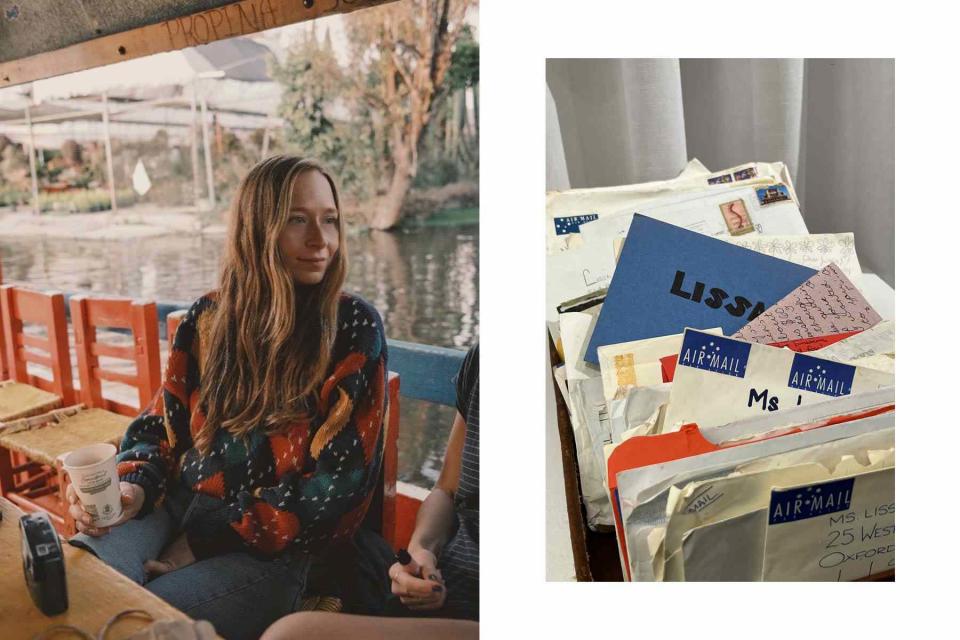
Eliza Dumais
For years, I stole teaspoons from restaurants. They were, for me, souvenirs of perfect meals — proof that I’d tasted things, that I’d loved them. Sometimes, I’d pocket them before dessert had even arrived, as if the storing of the memory were more critical than the real-time event as it unspooled. Technically, it’s a form of petty theft — but nobody says as much if you call it collecting.
On the whole, it would seem that we’re most enamored of “collecting” on two precise occasions: when in transit and when in love. In foreign cities, we amass train tickets, matchbooks, beaded things, paper maps, proof that we ate there, swam there, breathed that air. Falling in love, then, we play at tourism of a different kind, new thresholds of sensation, new modes of translation. We save handwritten notes, birthday gifts, wine corks, photographs. Artifacts that, like souvenirs, grow heavier when they refer to something in the past tense.
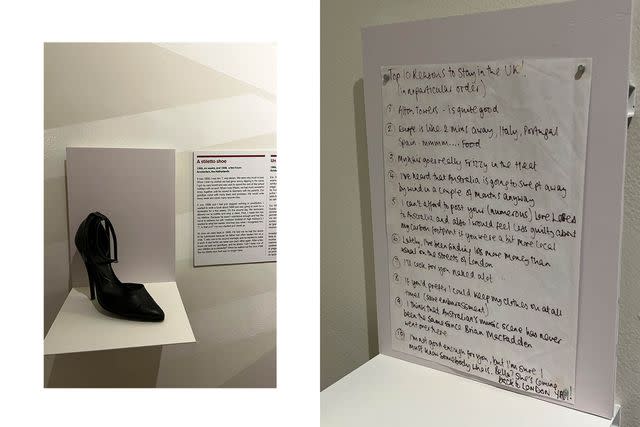
Eliza Dumais
The Museum of Broken Relationships was founded in 2010, home to countless “souvenirs” of — you guessed it — broken relationships. While the original concept still stands in Croatia, outpost exhibitions have cropped up across the globe, lending limited-time shelter to assorted relics of local heartbreak: well-worn T-shirts, cracked ceramics, hand-written Post-it notes, pregnancy tests — each submitted with a testimonial outlining its significance. Each insisting that, yes, we were here, we were real, we happened, look at this thing, see for yourself.
I visited the exhibition — a satellite installation in Mexico City — three weeks into the first long-term trip I’d ever undertaken without a partner. Or, at least, without a partner awaiting me at home, phoning me at the airport to ensure I’d landed safely. My most recent breakup was still fresh, raw enough that it lingered in the space between pop song lyrics; haunted the edges of the novels I’d packed before departing.
I’d purchased my museum ticket with a wry eagerness, knowing the whole process would operate as some brand of wound-salting masochism. That it would magnify all the dismal, post-romance malaise I’d been lugging from continent to continent. Inside, I watched couples as they navigated the space — walking gingerly, reading hesitantly, clutching closer to one another with a proper air of couldn’t-be-us remove. I spent nearly three hours — long enough for daylight to lapse away into early evening — reading testaments to the ways heartbreak can rupture a whole life. The indelible quality to having loved transiently. Would you believe me if I told you that it didn’t hurt?
Not too long before I’d left for Mexico City, I’d spent a handful of weeks in France, performing labor intensive volunteer work on a vineyard in Chablis — harvesting, pressing, and sorting grapes, and measuring sugar densities. Participating meant leaving my partner at home for a month in total. This wasn’t an anomaly, per se — working as a journalist had long provided me many a (comped) opportunity to travel for research, attend press trips, write from cafes on foreign soil. Lately, however, I’d found myself looking for excuses to stay gone. I liked watching myself operate out of context.
In Chablis, more than most places I’d been, I felt something shift in my brain. Every day, I clipped bunched grapes from limbed vines for hours on end, telling secrets in broken French, drinking wine, pressing barrels of pinot noir with my feet, and sleeping better, harder, deeper than I had in years — in spite of my incessant claims that yes, of course I slept better with a partner, it’s always been that way. Every now and then, I’d take stock: Picture myself from above, bone-tired, bleeding, muddy, stinging with grape juice, stumbling through a language that was not my own, enjoying my own company. Feeling emphatically, dizzyingly grateful to be a solitary whole, not a half of something else.
After some weeks at home in New York, I bought a one-way ticket to Mexico City. I had a close friend with a spare room — mine for free if I wanted it — and a handful of location-specific writing assignments to tackle. When my partner — let’s call him S — asked if I’d purchased a return flight, I could see the distaste leaking across his face: What kind of partner prefers, eternally, to be elsewhere? Why hadn’t I invited him? Why hadn’t securing a return trip felt worthwhile?
We broke up less than 24 hours later (I’ll spare you the gory details — it was neither succinct, nor tidy, nor void of sloppy, liquid emotion). We’d been on-again, off-again for years — the “off” periods feeling more like emotional experiments than full-on “breakups.” Lately, however, I’d been feeling stuck, hungry for new momentum. I was ready to leave in the permanent sense — or, as ready as anyone ever is.
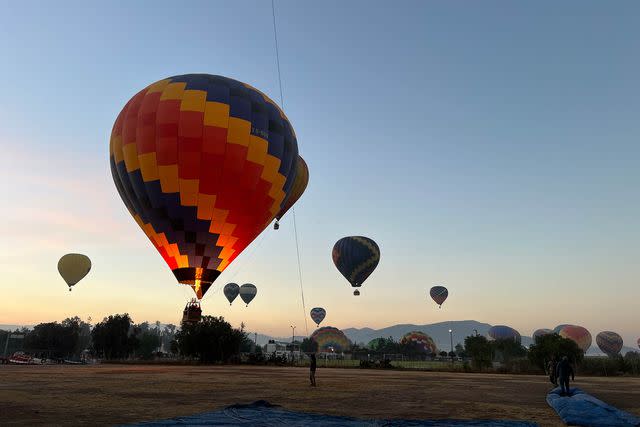
Eliza Dumais
And yet, the fact remains: Love a person, sleep next to them for years, and no matter how ready you are, you’ll still feel the sour lack of them, calcifying somewhere inside of you like an ulcer. It’s not the sort of thing you can choose to leave at home — even when your departure itinerary includes a one-way flight to Mexico.
In the Museum of Broken Relationships, I lingered by a lighter, left behind so its keeper could light her gas stove. An origami dinosaur folded from green paper; a single, lonely stiletto; a list of reasons to stay in the U.K. scrawled in ballpoint pen.
The admissions were funny, bitter, angry, forlorn. They were clever and hopelessly cliché. They were raw, tiny, and devastatingly human. I loved them — all of these people and their wretched knickknacks. How tragic that they’d never know how much I loved them.
It’s only natural, in a space like that, to contemplate what you yourself might submit if the opportunity arose. For me, it was obvious: a script S and I had been writing together with just two roles, each of us penning speech for our respective characters. For nearly two years, we’d passed the pages back and forth between us, silently adding mouthfuls of dialogue, conversing on paper. Often, we’d both be working, cooking, doing other things with our hands, speaking to one another only in prose, at what seemed to be a different frequency from the usual modes of human rapport. I’d fall asleep before him and he’d add to the draft, leaving the pages beside me so that, when I inevitably woke up first, I could add my own lines, too. It was our way of committing to constant back-and-forth, of ensuring that whatever buzzed between us lived somewhere tangible.
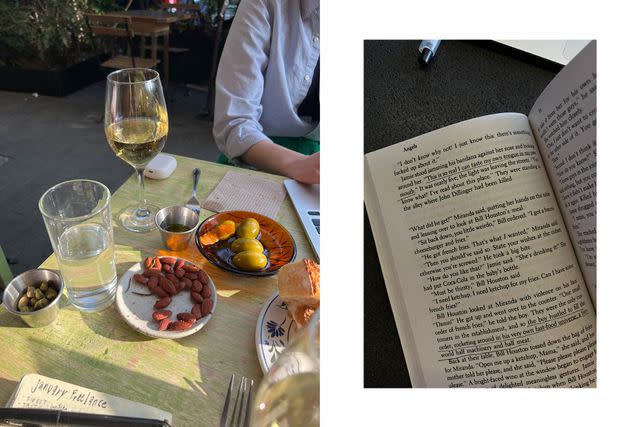
Eliza Dumais
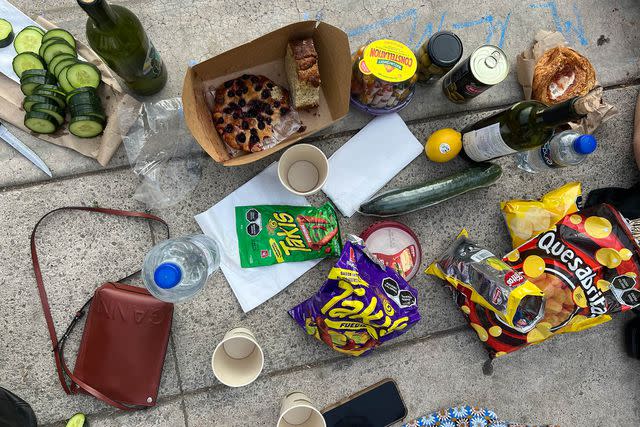
Eliza Dumais
When I left the museum, I sat outside at a cafe in Roma Norte. I’d been here, at this specific table, most days since I’d arrived, writing in the mornings, sometimes returning for glasses of wine when the sun turned mellow and hazy. I ordered a Negroni, delighting in the ways Spanish small talk was growing more familiar in my mouth — no longer a game of linguistic acrobatics. Someone’s dog crawled into my lap — the owner of whom merely giggled from the table beside me, without moving to retrieve his animal. The bartender came out and kissed me on the cheek — we’d sat together, gossiping in broken Spanish (mine, at least — hers was perfectly intact) earlier that week. I’d been reading a novel by Lidia Yuknavitch — and I’d thought it was so good, I couldn’t help but grin, sometimes audibly gasp, at certain perfect lines.
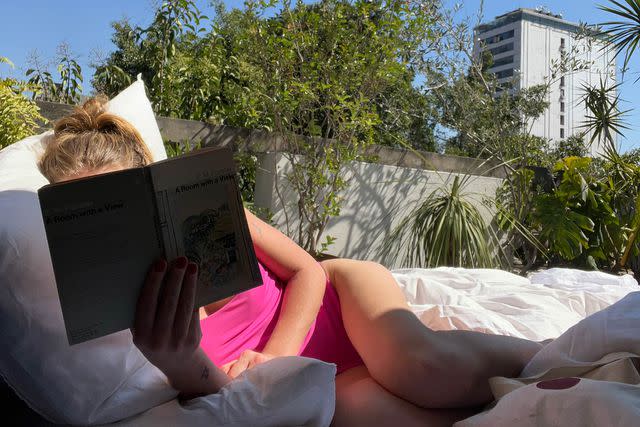
Eliza Dumais
I’d spent the month ingratiating myself with the parts of the city I was most enamored by. I’d discussed playlists ad nauseam with the owner of a natural wine bar I often visited at the start of my evenings. I’d begun translating a book of surrealist prose poems as a favor for the author, a bartender I’d met at the mezcaleria next door. A Dutch man I’d befriended at a bar in Juárez gave me a haircut in his Airbnb kitchen. One evening, at a restaurant near Chapultepec that I’d come to adore, the chef and owner scooted into the booth beside me to chat after the kitchen had closed. “It’s all very romantic here at first,” she told me. “Promise you’ll let me know if you need anything?”
I was still raw — but in that, I’d been pried open; rinsed of whatever barrier had been shielding me from the loud, stubborn fact of the rest of the world.
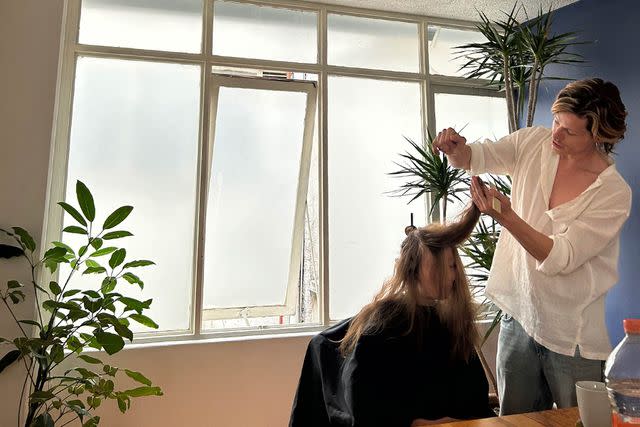
Eliza Dumais
Post-exhibit, I’d already imagined the ways I would sit, wallowing in the sour taste that comes with the word “single” while it’s still new, mentally rifling through countless, violently true tales of heartbreak. But the fact remained: It didn’t hurt. At least not with the apocalyptic, heat-of-a-thousand-suns intensity I am aware a breakup can unleash. Instead, the sentiment seemed to be located in an altogether different part of my body.
I missed something that was gone — felt the palpable cavity where S once stood. But I didn’t want it filled in — by him or anyone else of a similar shape. I missed him in the way I’ve missed countries; being certain ages. The ways I missed grape skin lodged under my fingernails; the bitter residue of espresso in Sicily; bicycle lanes at midnight in Copenhagen; the vicious sting of February air in upstate New York. A present tense nostalgia, if you will.
We don’t often use the word “souvenir” for things we acquire close to home. But this script, an artifact of S and me, was neither eulogy nor tombstone. Like the absurd salad of teaspoons I’d amassed in my silverware drawer, it was an homage to a certain context we’d built together, and lived in for quite some time. What else was it, if not a souvenir of us? Soon, it would live amongst museum passes, 35mm film prints, bar coasters I’d collected while salivating over the frenzied high of being elsewhere, untethered, on my own. All of it: the debris of real life, well worth holding onto — so long as it would fit in a carry-on.
For more Travel & Leisure news, make sure to sign up for our newsletter!
Read the original article on Travel & Leisure.

